#had to throw a shinji version in the ring
Explore tagged Tumblr posts
Text
have u ever seen a grown man smile?
#doodle#persona 3#shinjiro aragaki#minato arisato#yukari takeba#junpei iori#fuuka yamagishi#i dont do animatics or vids or anything like this but this trend makes me laugh so#had to throw a shinji version in the ring#isnt he just so dreamy ?
376 notes
·
View notes
Text
drabble: daiya boys getting jealous to you wearing another guys jersey !
characters: multiple characters x fem! reader
request status: OPENED / all fandoms pinned to the top of my blog as well as rules and req status! happy sending!
Miyuki Kazuya:

- mans so confused? why are you wearing Eijun’s jersey. he had specifically gotten you a jersey that had his number for you to wear and the fact that you were wearing his pitchers jersey was completely throwing him off. especially because it was a game day and you were helping the girls with their cheering today and he wanted you to be in his jersey while you did it.
- you were talking with Eijun and Nori, trying to get their pre-game jitters to settle the tf down. it didn’t even seem like you bothered by the fact that you wearing Eijun’s jersey and although Miyuki did not want to cause a scene, a part of him wanted a explanation.
- as he was about to walk to you for an explanation, you got dragged away by the girls as he was called onto the field. he saw you a bit later on the stands, you were talking with the girls, every so often, the in field camera would pan to you and show off you wearing Eijun’s jersey. his eye continuously twitched at it and it wasn’t until the end of the game when he finally got the chance to approach you about it.
- “why are you in his jersey?” he asked, lifting the jersey as if it was dirty. you laughed, sensing that he wanted you to take it off so you did, “i got Red Bull over the spare one you gave me and Eijun offered to take me to the locker room to get another one of yours but i guess i grabbed his spare by accident,” you laughed. Miyuki sighed understandingly but took his sweaty jersey off and putting it on you, “yours stinks you know,” you told him, giggling at his possessiveness, “i know but i’d rather you smell like dirty me than to have that idiot smelling line you.” you laughed, kissing his cheek as you heard a few of the girls call you over to catch dinner, “i’ll see you after dinner!” you screamed as he watched you, finally satisfied that you were wearing his jersey now.
kuramochi youichi:
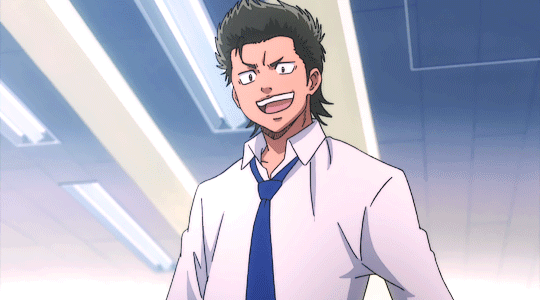
- you thought you got off easy with miyuki? MANS WAS PISSED. you were adorning Shinji’s jersey when he had specifically given his to you. kuramochi walked up to you, seeing you talking to a few of your friends in front of your home room. he didn’t even ask, he practically dragged you over to a corner.
- “what up with the jersey?” he asked, pointing to Shinji’s number. you rolled your eyes, “um, this is the one you gave me? what the hell are you on?” you asked, trying to see the number. he shook his head, “the fuck it’s not. you’re wearing Shinji’s jersey!” he exclaimed, “take it off,” he stated, as he yanked your back pack off you and watched you annoyingly take it off.
- kuramochi looked at the time. you had about ten minutes before class started and that gave him enough time, “come with me,” he said, dragging you out of the hallway and basically darting to the boys baseball locker room. you were screaming at him, asking him where the hell he was dragging you off too. it wasn’t until you saw the boys locker room approaching when you finally realized.
- he told you to wait a second and not even a minute after, he walked out of the locker room, holding his jersey in his hand and throwing Shinji’s into the hallway, not caring where it landed. Mochi put it on for you, making sure his number was showing. you looked at him and saw a blush on his cheek, realizing that he was flustered by how you looked with his jersey on.
- you leaned up, giving him a kiss on the lips before smiling, “i like this one better,” you giggled. he gave you a hearty laugh, before returning the kiss, “you better because it’s mine,” he said in-between kisses. the kiss seemed to go on longer than you had realized as the two of you heard the two minute bell ring off, “race you to home room,” you told him as the two of you basically darted off to class.
Narumiya Mei:
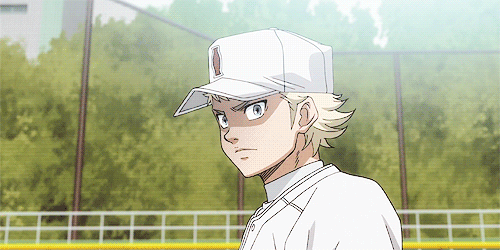
- GODDD, you got the whiniest of the bunch, omfg. he sees you wearing Carlos’s jersey and he immediately starts getting dramatic. he complains to Itsuki about why aren’t you wearing his and when he finally approaches you, you could see the whiny look on his face, “why are you wearing Carlos’s jersey!” he said.
- “i decided to wear everyone’s jersey as a way to support the team as the manager,” you said, not bothering to play into his attitude. he could tell you were annoyed by his attitude and figured since you were being this way, two could play this game. he knew you found his fan girls annoying as FUCK so he went to the common area and immediately got flocked with attention.
- you had walked into that same area to get a water for yourself and saw the commotion around Narumiya. you saw the way girls were basically hanging off of him and realized this was his way of revenge for wearing Carlos’s jersey. you felt slightly annoyed, kinda jealous but knew the best way to get him back for it. and that way was to openly flirt with Carlos when he finally made his way to the dugout.
- once you got Carlos into the plan, he waited until Narumiya arrived to take his shirt off in front of you. you had seen this plenty of times before but acted ‘flustered’ to get a reaction from Narumiya...which is exactly what you got. you flustered expression around Carlos made Narumiya pissed as he saw Carlos basically laying it on thick. he was being extremely flirty around you and even wrapping his arm around you for a few seconds at a time until Narumiya finally had enough.
- he, without hesitation, took off his own playing jersey and yanked Carlos’s off, “wear it....now,” he stated, darkened jealous eyes showing. you had never expected his reaction from him before but giving yourself the benefit of the doubt, you slipped his on but still saw the expression written on his face, “we’ll deal with this later,” he murmured as crashed his lips onto yours, giving everyone in the dugout a free show. you were stunned with silence as Narumiya let you go and wiped away the lipstick you wearing in front of Carlos.
Sanada Shunpei:
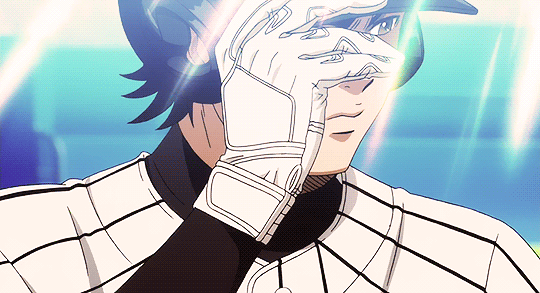
- you were wearing Todoroki’s jersey and frankly, he was upset but not as much as he should’ve been bc i mean, it was Todoroki, you couldn’t get mad at that cinnamon roll for a long time. it was hard when Raichi was basically a walking two legged version of the sun but that was besides the point, he hated seeing you wearing another number that wasn’t his.
- you were talking to Todoroki, giving him a few tips on how to keep his bat in decent care when Sanada finally approached the two of you. he had a tight lipped smile as he sat next to you and putting his hand on your thigh and giving it a tight squeeze, causing you to squeal slightly in the process. Todoroki hadn’t noticed as he continued to blabber on about his precious bat.
- finally, his dad had called him over for something, causing Todoroki to run over there as Sanada looked down to you, “what up with Todoroki’s jersey?” he asked, making sure he emphasized his name. you shrugged, still smiling at him, “felt like supporting him,” you explained, “he’s like a little brother to me and i wanted to make sure he knew he had someone’s support on the stands.” Sanada’s heart fluttered, any sign of jealousy leaving his body as he heard what you were saying.
- he loved the fact that you were so sisterly to Raichi. there would be days where you would bring all three of you lunch on the field as you knew that if Raichi didn’t eat school lunch, he’d practically be running on a banana diet for the entirety of the day and you were not about to have that happening.
- you leaned up, giving him a quick peck on the lips, “don’t worry, the only other person’s jersey i would wear is yours,” you whispered into his ear, “and if you win today’s game, you can see me in just that and nothing else.” Sanada instantly perked up up, agreeing to what you were saying as he got dragged up from the bench by a few of his teammates.
hongou masamune:
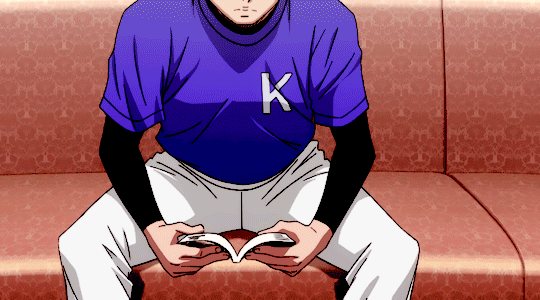
- he’s seething and that doesn’t even begin to explain it. one of the first things he did as your bf was give you his jersey to make a statement that you were his and to back THE FUCK off and now here you were, wearing Renji’s jersey for some god awful reason. he knew Renji was his best friend but seeing you wearing Renji’s jersey just ticked him off more than usual.
- Hongou approached you, dragging you away from the team as you tugged yourself back, trying to get him to explain why tf you were getting dragged away from everyone. when he finally got you to himself, he didn’t even hesitate to yank off Renji’s jersey, “why?” was all he asked as you sighed in disbelief, “why am I wearing Renji’s jersey?” you asked as he nodded, “because i lost a bet with the fucking idiot and my punishment was to wear his jersey to a game.”
- Hongou didn’t really like the idea of this bet so he practically gripped his best friend’s jersey and took his off in the process, “you’re wearing mine and that’s final,” he stated, walking back to the loccker room to get his spare jersey from his stall. he shrugged his on as the two of you walked back to the team and he practically whipped Renji’s jersey back to him, “take yours back idiot,” he screamed to Renji making you laugh.
- you shrugged, not really knowing what to say to Renji as he was caught off guard, “told you he’d react that way!” you exclaimed, laughing now, “you act like you don’t know your own best friend,” Renji silently agreed knowing you were right. you saw Hongou on the field, practicing extra harsh as you silently apologized to the other team for the ass kicking they were about to receive bc of Hongou.
- you waved to Hongou throughout the game, whispering ‘i love you’s’ you him to try and get him to calm down but you knew that was no use. being Hongou’s gf meant that you were going to have to get used to dealing with his constant angry attitude and you knew that nine times out of ten, you were going to repay for your little bet with Renji bc of it. Hongou’s punishments on the other hand weren’t as bad as you liked to make it seem tho. you usually got some pretty good aftercare from him when it was all said and done.
#daiya no ace#daiya no ace x reader#daiya no ace imagine#Ace of Diamond#ace of diamond imagine#dna#aod#miyuki kazuya#miyuki kazuya x reader#miyuki kazuya imagine#narumiya mei#narumiya mei x reader#narumiya mei imagine#kuramochi youichi#kuramochi youichi imagine#kuramochi youichi x reader#sanada shunpei#sanada shunpei imagine#sanada shunpei x reader#hongou masamune#hongou masamune imagine#hongou masamune x reader#sport anime#sports anime
320 notes
·
View notes
Photo
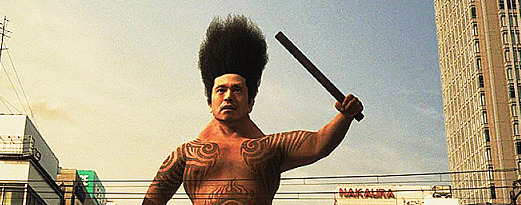
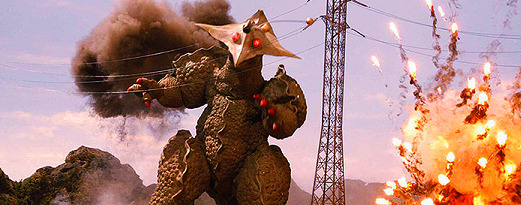
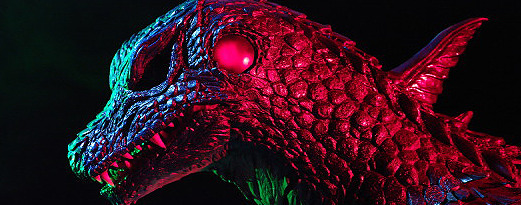
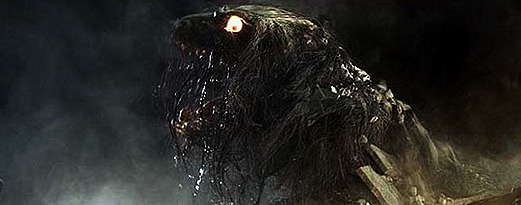
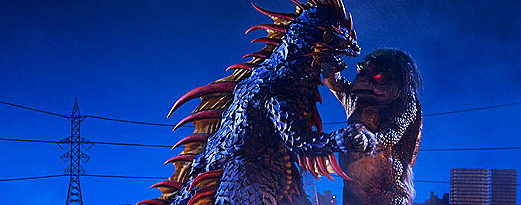
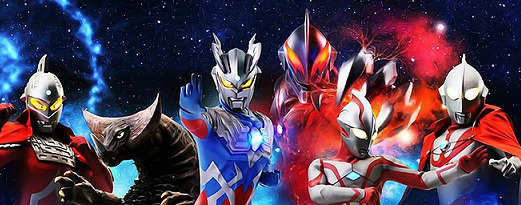
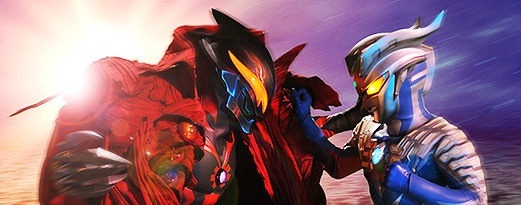
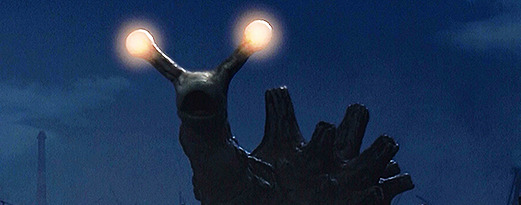
In the kaiju circles I usually run in, we tend to refer to the period between (and including) 2007 and 2012 as the “wilderness years”, i.e., a time when the output of new, original kaiju media reached a significant low. That’s not to say there wasn’t anything new – independent films like Deep Sea Monster Raiga and Geharha, the Dark and Long-Haired Monster gained attention in 2009, while the omnipresent Ultraman franchise quietly but steadily beat on against the popular current. Perhaps the perceived lack of output is not the reason we refer to these years the “wilderness” – there was almost at least one new production for each of the aforementioned years. Rather, the wildly varying quality of this period’s output is a more likely explanation. An even bigger contributing factor may be the lack of a big name franchise to anchor this period, with Godzilla having gone on self-imposed retirement in 2004, and a new Gamera franchise failing to take off after 2006’s Gamera the Brave.
In the 1960s, the presence of Toho and Daiei’s mega-franchises allowed competing studios to throw their hats into the kaiju ring – Nikkatsu offered up Gappa, the Triphibian Monster (1967), Toei introduced us to The Magic Serpent (1966), and crashing down to Earth came The X From Outer Space (1967), from Shochiku. With Godzilla and Gamera raking in mega-bucks at the box office, these alternative offerings were able to bask in reflected glory. However, between 2007 and 2012 no such big franchises existed, and while Ultraman persisted, his popularity and box office draw was the lowest it had been since the franchise was resurrected with Ultraman Tiga (1996). During Godzilla’s Millennium series (1999 to 2004), Japanese filmgoers became fatigued with the varying quality of each successive production, and eventually grew tired of giant monster action on the big screen. Gamera’s attempted resurrection in 2006 never stood a chance – the climate simply rendered it moot.
The “wilderness years” nonetheless represent something relatively unique in the history of the kaiju genre: a surprisingly high number of kaiju comedies were produced in this time. Much like the spaghetti-western in the ‘70s, perhaps kaiju filmmakers sought to keep the genre alive by introducing over-the-top comedic elements to the traditional genre structures in the search for something fresh and new. The first of the big kaiju comedies was Hitoshi Matsumoto’s Big Man Japan, released in 2007. Something of an absurdist deconstruction of the “giant hero” genre, the film features Matsumoto himself as a deadbeat loser with no friends, strained relationships with his few family members, and a lifestyle just above the poverty line – and who can transform into a giant to combat kaiju attacks. In a highly surrealistic ending – even by this film’s standards – Big Man Japan even manages to make a statement about Japan’s uneasy relationship with its superpowered ally, the United States. Acting as something not unlike a kaiju play on This is Spinal Tap!, Big Man Japan is perhaps not the most accessible kaiju comedy for Western viewers, but is certainly at least something entirely new for the genre during a time when it desperately needed exactly that. However, for every This is Spinal Tap!, there’s sure to be a Superhero Movie, or Epic Movie, or…
Minoru Kawasaki’s Monster X Strikes Back! Attack the G-8 Summit – a satirically flaccid attempt to parody the leaders of the free world – could not have come at a worse time. Resurrecting the monster Guilala from The X From Outer Space after an absence of 41 years on the screen, the film makes two tardy fundamental errors: coming along after Godzilla and Gamera were both discharged from active duty, and reviving a one-shot monster that hadn’t been seen on the big screen (in any non-stock footage cameo capacity) for four decades – even then, that was during what was practically the complete opposite of the wilderness years: the “Kaiju Boom” of the 1960s. 2008 also saw the release of Great Decisive Battle! Superior Ultraman 8 Brothers, the 20th theatrically released Ultraman movie. Featuring return appearances from characters that spanned 40 years of the franchise, the film is a very fine one, but ultimately falls into the pitfall that so many Ultraman features do: overdependence on the audience’s familiarity with the franchise’s rich history. This problem is especially highlighted by the fact that the film largely takes place in an alternate universe with equally alternate versions of otherwise familiar characters.
2009 was somewhat kinder to the kaiju genre, with a generally more favourable slew of features seeing release. Shinpei Hayashiya, responsible for the legendary fan-film Gamera 4: Truth (2003), released the second film in his Reigo/Raiga series, Deep Sea Monster Raiga. A sequel to 2005’s Reigo: The Deep Sea Monster vs. the Battleship Yamato, the film – to put it lightly – is an uneven one, and suffers from a wildly irregular tone and some flat attempts at humour. Nonetheless, Hayashiya’s adoration of the genre shines through enough to make the film at least an enjoyable one. An even more affectionate tribute to the genre shines through in the 20-minute short Geharha: The Dark and Long-Haired Monster. Featuring direct homages to the likes of Invasion of Astro-Monster (1965) and The Mysterians (1957), Geharha benefits from a brisk running time and breakneck humour, all the while being careful not to mock the genre itself, but just affectionately have fun with it. Director Kiyotaka Taguchi would – very deservedly - go on to anchor the Ultra series’ return to glory, working on the television productions Ultraman Ginga (2013), Ultraman X (2015), Ultraman Orb (2016), and their movie counterparts.
The same cannot be said for Tomoo Haraguchi’s Death Kappa (2010). Produced with noble intentions – to film a new, original kaiju film created entirely through the use of traditional tokusatsu effects techniques – Death Kappa is nothing short of a trainwreck of a movie. Much of the humour is detrimentally absurd, and some jokes commit the cardinal sin of actually making fun of the genre and techniques it claims to be paying homage to. Haraguchi’s intentions were certainly commendable, but the finished product ranks among the very worst of the kaiju genre and – somewhat dishearteningly – is a film that betrays its own modus operandi. Haraguchi’s efforts (or lack thereof) are doubly disappointing considering he previously worked on the outstanding special effects of Gamera: Guardian of the Universe (1995), and Gamera 2: Advent of Legion (1996). Aside from cameos from future Shin Godzilla directors Hideaki Anno and Shinji Higuchi, Death Kappa is ultimately a film best left forgotten about, and most likely will be.
The “wilderness years” saw the release of two further Ultraman films: 2009’s Mega Monster Battle: Ultra Galaxy Legends! The Movie, and its direct sequel Ultraman Zero: The Revenge of Belial in 2010. Both films are among the very best of the theatrical Ultra series, and thrust the franchise’s visuals lightyears forward by heavily combining traditional tokusatsu effects with substantial helpings of green-screen and CGI. While gratuitous green-screen photography can look ugly when used in excess, the vast space opera-esque lsndscapes richly brought to life in these two Ultra-films are a testament to Tsuburaya Productions’ willingness to try new things to ensure their most iconic franchise remains relevant, fresh, and most importantly, fun, without ever betraying or abandoning the core dynamics and conceits of the franchise.
Among these uneven times, however, emerges a diamond in the rough: 2009’s Demeking, the Sea Monster, a theatrical adaptation of a popular 1991 manga by Takashi Imashiro. Despite what could be argued a misleading title, Kotaro Terauchi’s film is a quietly beautiful meditation on the importance and inevitability of accepting the responsibilities that come with growing up. The sea (in actuality, space) monster of the title only appears in a magnificently shot dream sequence – something the film has received frustratingly undeserved scorn for from the wider Western kaiju community – and this is absolutely to the film’s benefit. Demeking becomes a coming-of-age subversion of the genre itself: a kaiju movie without a kaiju, or at least the literal physical appearance of one within the film’s internal world. While certainly not for the average viewer who is simply looking to enjoy a traditional kaiju romp, Demeking is a woefully underrepresented movie that stands out as the crowning jewel of a difficult period in the genre’s history.
It’s worth mentioning that these “wilderness years” also saw Heisei Godzilla special effects director Koichi Kawakita release his short film The God of Clay, while in 2009 the independent feature Daikaiju Eiga “G” saw release. All was not quiet on the Western front with the highly-secretive release of Cloverfield, while on Japanese television, Tsuburaya Productions released Ultraseven X, two seasons of Ultra Galaxy: Mega Monster Battle, and the compilation clip-show Ultraman Retsuden. 2010’s Daimajin Kanon reintroduced Daiei’s stone idol in a serialised television format, with mixed degrees of success.
The wilderness ended in 2013, which saw the seeds of the current kaiju renaissance being planted. Guillermo Del Toro’s mechs-against-monsters epic Pacific Rim paved the way for Legendary’s MonsterVerse, the Ultra franchise returned to television and begun its current successful streak with Ultraman Ginga and Neo Ultra Q, with each subsequent series proving more successful than the last. Minoru Kawasaki also released his second kaiju feature, Earth Defence Widow – but the least said about that, the better. As previously posited, these “wilderness years” can be defined not by their lack of kaiju productions, but perhaps instead by the absence of a steady ongoing franchise to anchor the period, and the inconsistent quality of the content these years did produce. However, regardless of the value of the period as a whole, the ragtag group of productions that formed the “wilderness years” kept the flame of the kaiju genre burning long enough for it to be rekindled with the widespread genre resurgence enjoyed today.
#essay#writing#kaiju#kaiju wilderness years#godzilla#ultraman#monsterverse#toku#tokusatsu#daikaiju#kaiju eiga#blog post#blog#text#guilala#demeking#big man japan#monster x strikes back#death kappa
332 notes
·
View notes